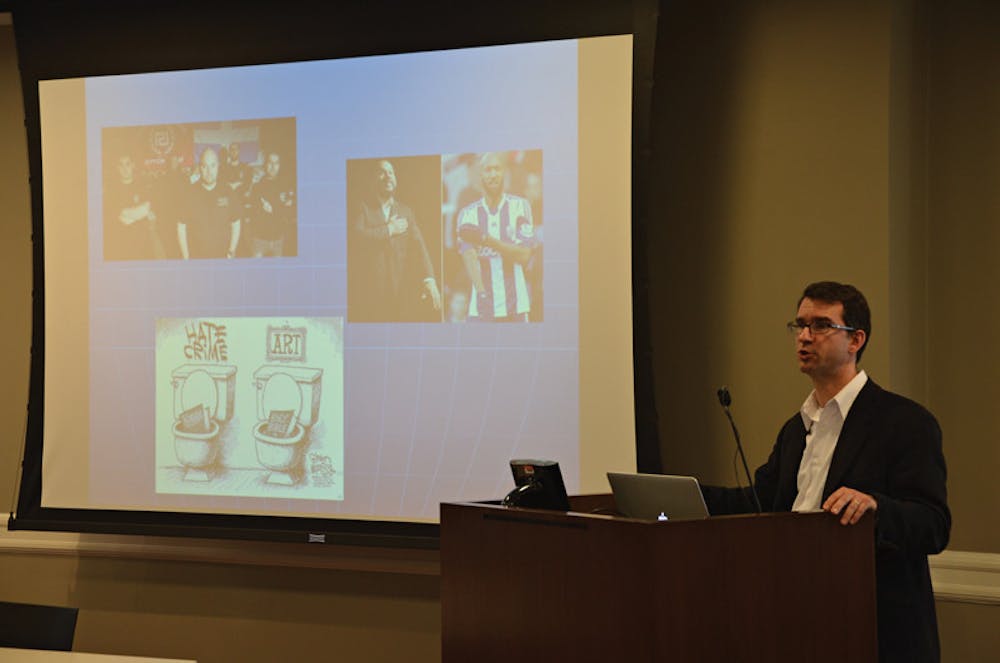“How much freedom should racists have?” asked Erik Bleich ’91, professor of political science at Middlebury College, in his Wednesday lecture that explored how the United States and Europe strive to combat racism without infringing on citizens’ rights.
The talk was the fourth and final installment of a lecture series entitled “Antisemitism and Islamophobia” inspired by a course in the Judaic Studies department of the same name. The lecture drew around 20 undergraduates in the class to Petteruti Lounge and was followed by a discussion sesssion including Bleich and class members.
Bleich explained why “different countries have gone in different directions” with legislation that aims to curb racism. Bleich also spoke about how much freedom is currently granted to racists — in domains such as freedom of speech, freedom of association and freedom of opinion — and how much freedom they should be allowed in the future.
The “overarching historical pattern” since World War II has been a movement away from protecting freedom and toward fighting racism, he said, with countries moving “at varying speeds in different domains.”
Bleich pointed to Great Britain and Germany as representative of the national differences in approaches to curtailing racism. Great Britain passed three laws on race relations in the 1960s and the 1970s restricting racial discrimination and certain forms of racial speech, in addition to banning incitement to racial hatred.
“If your words incite action, the action itself is criminal,” Bleich said. “It’s different in these laws … racial hatred is an opinion, (but) if you’re inciting an opinion, even a legal one, you are deemed to be contravening the law.”
Britain has passed more restrictions since the 1970s, including a 1991 law that instituted additional penalties for racial motives in aggravated offenses, Bleich said.
Germany has taken a different path in checking racism. Though the country has enacted measures against certain kinds of racist speech, particularly Holocaust denials, it has fewer limitations on racist discrimination and hate crimes.
The United States, in an “important contrast,” has expanded freedom for racist speech, he said.
“Americans tend to think, haven’t we always had this radical freedom of racist speech? Isn’t that part of our Constitution?” Bleich said.
But these freedoms are not written into the Constitution, and the freedom to say “whatever horribly offensive racist thing we want in public” actually stems from a series of Supreme Court decisions from the 1920s through the 1970s, he said.
The United States has been “internally inconsistent” by restricting freedom of opinion as motive “further and faster than any other country” while at the same time allowing more racist speech, he said.
America “is the leader in restricting racial discrimination and a leader at the state level in passing hate crime laws,” Bleich said. “America decided that these forms of racism are dangerous, destructive and unacceptable.”
The reason for different outcomes in different countries is Bleich’s theory of “context and confluence,” which focuses on “shifts in multiple interacting variables at a particular moment in time,” he said.
Governments “can’t make policy change at any moment at any time in any country, there have to be certain windows of opportunity that open or critical junctures that come together to allow it,” Bleich added.
Bleich used the German laws passed in the 1990s banning Holocaust denial to illustrate his theory. Simultaneous factors — such as a spark in racist activity throughout the world, international pressure on Germany to pass such laws and the legal ambiguity of previous Holocaust denial laws — merged to create a climate where such laws could be passed in Germany.
Bleich also stressed the importance of considering the effects of racism-restricting laws.
“If these anti-racist laws radically restrict important freedoms, then they’re a big problem, but in most cases they don’t,” he said. “The way in which these laws have been enforced has not been heavy-handed; it has not been oppressive.”
Restricting liberty can be justified when it prevents harm to others, Bleich said, noting that while some kinds of harm are measurable, such as when an individual suffers from post-traumatic stress disorder stemming from a hate crime, racism that creates an atmosphere of hatred is “harder to judge.”
In resolving the tension between limiting racism and supporting freedoms, it is necessary to “focus on democracy and liberal democracy, mobilize people, challenge opinions, try to convince them and get them on your side,” Bleich said. “It’s a way to think about balancing any two core values.”
Margot Hauer ’15 said she appreciated Bleich’s idea of “context and confluence,” adding that she was interested in how this idea applied to the post-Holocaust era.
Elayne Oliphant GS, a post-doctoral student studying religious studies, said she read Bleich’s book entitled “The Freedom to Be Racist” before attending the lecture and “loved the model of a public engagement with the author.”
“It’s such a different experience from reading books or discussing books in class,” she added. “It gives the author a chance to make (his) case.”

ADVERTISEMENT




